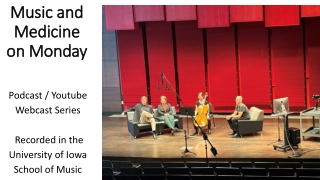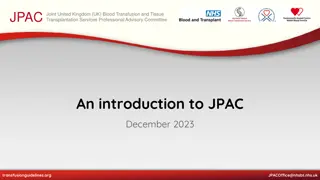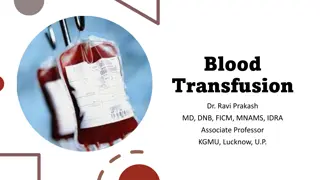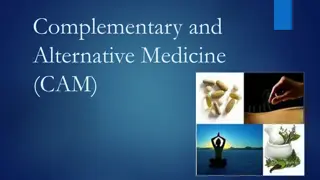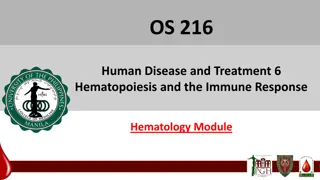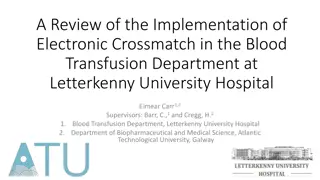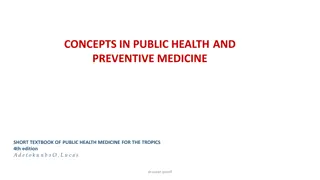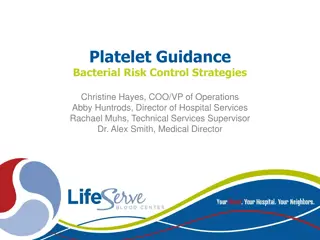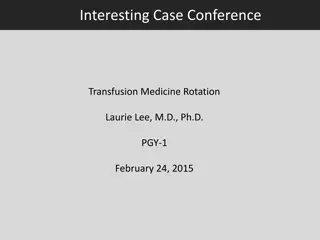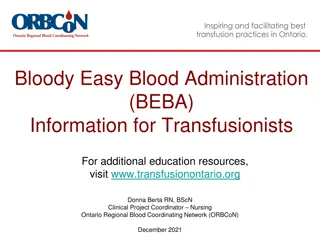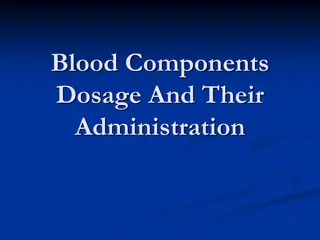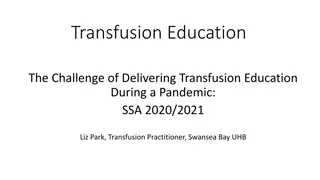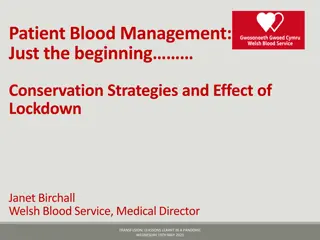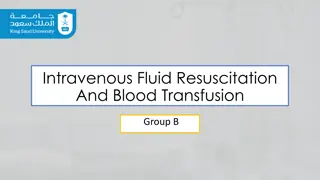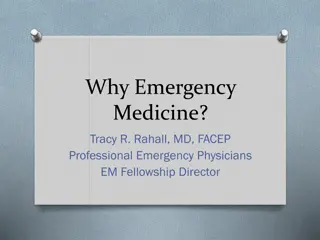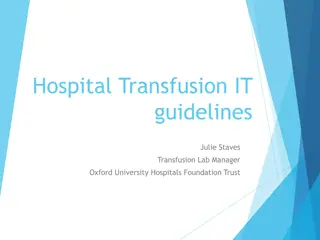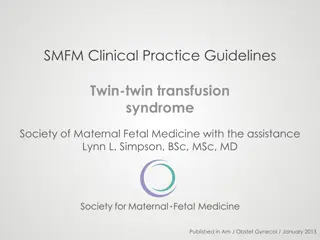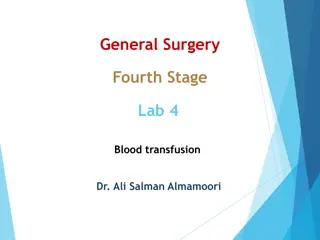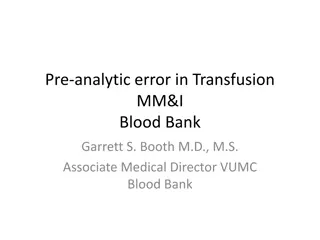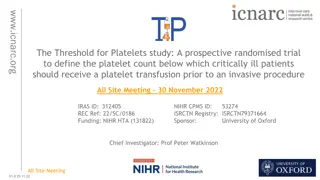Music and Medicine Medicine on Monday
Delve into the collaboration between the University of Iowa School of Music and School of Medicine with their podcast/webcast series "Music and Medicine on Monday." Each episode features discussions on various music-related health topics, performances by students, and insights from medical experts.
1 views • 12 slides
Transfusion
Blood transfusion is a crucial medical procedure worldwide, with various components like packed red blood cells, plasma, platelets, and cryoprecipitate being utilized for efficient use. Differential centrifugation is employed for component preparation, ensuring precise separation of red blood cells,
2 views • 45 slides
Pathogen-reduced platelets: clinical highlights
Pathogen-reduced platelets play a crucial role in reducing the risk of transfusion-transmitted infections through pathogen inactivation technology (PIT). This technology provides an additional layer of safety against various pathogens including viruses, bacteria, protozoa, and leukocytes. Platelet c
2 views • 17 slides
Importance of Single Unit Red Blood Cell Transfusion According to Patient Blood Management Guidelines
Implementing single unit red blood cell transfusion based on patient blood management guidelines is crucial to minimize risks associated with transfusion, such as morbidity, mortality, and length of stay. By following these guidelines, healthcare providers can make informed decisions, reduce unneces
4 views • 18 slides
Overview of Serious Adverse Reactions and Transfusion Events
This data compilation covers the reporting trends, breakdown of reports, components issued, and specific types of adverse transfusion reactions experienced within the National Healthcare Organization (NHO) from 2019 to 2022. The information includes statistics on Serious Adverse Events (SAE), Seriou
2 views • 46 slides
Understanding Lifestyle Medicine: A Holistic Approach to Health
Lifestyle medicine is a medical specialty focused on using evidence-based lifestyle interventions to treat chronic conditions like cardiovascular diseases, type 2 diabetes, and obesity. Clinicians trained in lifestyle medicine emphasize whole-person care through nutrition, physical activity, stress
11 views • 10 slides
MD MS IN UK WITHOUT PLAB,PG MD MS IN UK
MD MS IN UK WI Internal Medicine without PLAB is a Three Years Full Time Hands on Training Program. The course constitutes hands-on training in all major clinical specialties e.g. Cardiology, Acute Medicine, Gastroenterology, Diabetes, Psychiatric Medicine, Stroke Medicine and Neurology and others,
7 views • 4 slides
Overview of JPAC: United Kingdom Blood Transfusion and Tissue Transplantation Services
JPAC, the Joint United Kingdom (UK) Blood Transfusion and Tissue Transplantation Services Professional Advisory Committee, plays a crucial role in providing guidelines and ensuring standardization and safety in the field of blood transfusion. Established in the late 1980s, JPAC has evolved to become
1 views • 33 slides
Understanding Blood Transfusion: Components, Preparation, and Safety Measures
Blood transfusion is a crucial medical procedure involving the transfusion of different blood components to patients in need. This practice has evolved to include various components such as packed red blood cells, plasma, platelets, and more. The preparation of these components involves specific tec
1 views • 45 slides
Understanding Complementary and Alternative Medicine (CAM)
Complementary and Alternative Medicine (CAM) encompasses various treatments, ranging from herbs to yoga, that differ from traditional Western medicine. While complementary medicine involves using these therapies alongside conventional medicine, alternative medicine opts for non-mainstream approaches
2 views • 20 slides
Understanding Non-Transfusion-Dependent Thalassemia
Delve into the complexities of Non-Transfusion-Dependent Thalassemia as explained by Dr. Ashutosh Lal, MD, from the Northern California Thalassemia Center at UCSF Benioff Children's Hospital Oakland. Explore the various Thalassemia syndromes, patient profiles, causes, and transfusion requirements as
1 views • 25 slides
Difference Between Massive Transfusion Protocol (MTP) and Emergency Release of Blood Products
Both MTP and emergency release are protocols for immediate blood product release without needing a type/screen. However, MTP involves fixed product dispensing, while emergency release allows customization. MTP requires contacting the blood bank to activate or deactivate, while emergency release requ
0 views • 6 slides
Understanding Shock and Blood Transfusion in Surgery
Shock is a state of low tissue perfusion leading to metabolic changes like anaerobic metabolism and acidosis. As cellular hypoxia progresses, immune and coagulation responses are activated, impacting cardiovascular, respiratory, renal, and endocrine systems. Shock can be classified into hypovolaemic
0 views • 38 slides
Comprehensive Overview of Hematopoiesis and Immune Response in Human Disease and Treatment
This 1-week course delves into the pathophysiology, diagnosis, and treatment of diseases affecting the Hematopoietic System. Topics covered include benign and malignant hematologic disorders, pediatric and adult presentations, blood component therapy, transfusion medicine, and more. Faculty units fr
0 views • 20 slides
Implementation of Electronic Crossmatch in Blood Transfusion at Letterkenny University Hospital
This review explores the implementation of Electronic Crossmatch (EXM) in the Blood Transfusion Department at Letterkenny University Hospital. It discusses pretransfusion testing, crossmatching techniques, benefits, and challenges of EXM. The study aims to assess the benefits of EXM and identify way
0 views • 23 slides
Autologous Blood Donation: Advantages, Types, and Considerations
Autologous blood donation involves collecting and storing a patient's own blood for later transfusion, offering numerous advantages such as reducing the risk of transfusion-transmitted diseases and providing compatible blood for patients with allo-antibodies. However, it also comes with concerns lik
1 views • 46 slides
Understanding Concepts in Public Health and Preventive Medicine
The evolution of nomenclature in public health, from hygiene to preventive medicine and social medicine, reflects the collective efforts to prevent disease, prolong life, and promote health. Key elements of modern public health include collective responsibility, state intervention, prevention emphas
0 views • 16 slides
Ensuring Patient Safety in Blood Transfusion Services: Standards and Concerns
Hospitals providing Transfusion Medicine services must adhere to established standards to ensure patient safety and product efficacy. Facilities not carrying a laboratory license but receiving blood components must also meet these standards. Lack of standardized policies poses risks to patient safet
0 views • 20 slides
Unlocking the Clinical Significance of Alloimmunization in Transfusion Medicine
Alloimmunization, a critical side effect of transfusion, has been a challenge in matching phenotypes and genotypes globally. The detection of clinically significant antibodies requires a delicate balance between sensitivity and specificity, considering various controllable and uncontrollable variabl
0 views • 20 slides
Platelet Guidance: Bacterial Risk Control Strategies in Transfusion Services
Platelet transfusions carry the risk of bacterial contamination leading to severe infections and fatalities. FDA regulations mandate control strategies to mitigate this risk, such as implementing testing strategies and adhering to specific guidelines for platelet storage and handling. Understanding
0 views • 23 slides
Interesting Case Conference - Transfusion Medicine Rotation Laurie Lee, M.D., Ph.D.
One-day-old male infant admitted to the NICU for prematurity and respiratory distress, with a complex maternal history including multiple antibodies. Blood bank tests revealed a positive DAT, and molecular testing identified the patient as positive for JK*A and JK*B alleles. Interpretation suggests
0 views • 18 slides
Bloody Easy Blood Administration (BEBA) Guidelines for Transfusionists
This comprehensive guide provides transfusionists with essential information on blood administration, including transfusion guidelines for RBC, platelet, and plasma, actions for safe administration, and immediate management of transfusion reactions. It covers indications, doses, and details for adul
0 views • 49 slides
BHNOG Education Strategy Update 2021-2022 Overview
BHNOG's Education Strategy update for 2021-2022 focuses on enhancing transfusion pathway education across NHS Wales. The strategy includes proposed educational task groups, updates on various educational interventions for staff, and future development plans to improve training in blood transfusion p
1 views • 5 slides
Understanding Blood Components and Their Administration
Effective blood transfusion therapy relies on the availability and proper administration of various blood components. Separating blood components allows for better patient care by matching transfusions to individual needs and avoiding unnecessary components. Different blood products like packed red
1 views • 27 slides
International Hemovigilance: Current Trends and Insights
Explore the latest trends in international hemovigilance from presentations by experts like Dr. Pierre Robillard. Gain insights on incidence rates of adverse transfusion reactions, transfusion-related deaths, and global initiatives on defining reactions. Dive into data from various reporting systems
0 views • 30 slides
Challenges Faced in Delivering Transfusion Education During a Pandemic
In the midst of the pandemic, the delivery of transfusion education faced significant challenges. Transfusion Practitioner Liz Park from Swansea Bay UHB navigated through the obstacles, adapting the education process from in-person sessions to a virtual environment. The year 2020 marked the beginnin
0 views • 7 slides
Audit of Pre-Transfusion Sampling Process in Healthcare
An audit was conducted on the pre-transfusion sampling process within a healthcare board, revealing issues such as unnecessary duplicate samples, misidentification of patients, and delays in obtaining confirmatory samples. The audit highlighted the importance of secure electronic patient identificat
0 views • 12 slides
Understanding Antibody Screening and Pre-Transfusion Tests
In-house cell panel development, pre-transfusion compatibility testing, antibody screening methods, and the importance of ABO and Rh typing are discussed in detail. Steps for safe blood transfusion, reverse ABO grouping, AST testing for irregular antibodies, and selection criteria for screen cells i
0 views • 28 slides
Blood Management and Conservation Strategies in Pandemic Times
Explore the rationality behind patient blood management, the importance of audit in ensuring proper blood usage, and the role of national oversight groups in promoting safe and appropriate transfusion practices. Discover guidance, safety standards, and the use of O.D. negative red cells in emergency
0 views • 13 slides
Understanding Intravenous Fluid Resuscitation and Blood Transfusion in Clinical Practice
Intravenous fluid resuscitation and blood transfusion are crucial components of patient care, involving the direct administration of fluids and electrolytes to maintain proper fluid balance. When calculating the volume of fluid to be replaced, various factors must be considered, including maintenanc
0 views • 15 slides
The Role of Family Physicians in Emergency Medicine: A Historical Perspective
Family physicians have played a crucial role in the development of emergency medicine as a specialty, with many physicians transitioning and contributing to the field. Despite some controversy surrounding their role, organizations like AAFP have supported family physicians practicing emergency medic
0 views • 22 slides
Blood Transfusion Services Role in Massive Transfusion Events
Blood Transfusion Services play a crucial role in assisting with patient care during massive transfusion events. From notification to preparation of components and ongoing support, BTS staff ensure timely and appropriate transfusions, especially during emergencies. Communication with medical staff,
0 views • 6 slides
Integration of Complementary Medicine in Cancer Care in Tuscany
Describes the successful integration of Complementary Medicine in the network of Cancer Departments within the Tuscan Public Healthcare System. The initiative, spearheaded by experts in both Complementary Medicine and medical oncology, has led to the development of Regional Guidelines incorporating
0 views • 4 slides
Hospital Transfusion IT Guidelines - Overview and Updates
Comprehensive guidelines for Hospital Transfusion IT systems by Julie Staves, Transfusion Lab Manager at Oxford University Hospitals Foundation Trust. Explains the need for guidelines in ensuring patient safety, the structure of the guideline, recent changes, and new developments. Covers essential t
0 views • 18 slides
Clinical Practice Guidelines for Twin-Twin Transfusion Syndrome by Society for Maternal Fetal Medicine
This clinical practice guideline by the Society for Maternal Fetal Medicine provides recommendations for the diagnosis and management of twin-twin transfusion syndrome (TTTS). Key points include criteria for TTTS diagnosis, the usefulness of the Quintero staging system, the importance of serial sono
0 views • 18 slides
Blood Transfusion in Surgery: Types and Indications
Blood transfusion plays a crucial role in surgery, with different blood products such as whole blood, packed red cells, fresh-frozen plasma, cryoprecipitate, and platelets being used based on specific needs. Understanding the indications and proper handling of blood products is essential for safe tr
0 views • 13 slides
Enhancing Blood Transfusion Safety in Primary Care: Key Updates for Healthcare Providers
Blood transfusion safety is a critical aspect of healthcare delivery, with the potential for preventable errors posing risks to patients. Initiatives like the Serious Hazards of Transfusion (SHOT) program and Patient Blood Management have played significant roles in improving safety and reducing adv
0 views • 25 slides
Pre-Analytic Errors in Transfusion Process at VUMC Blood Bank
The case study discusses a 16-year-old female involved in a motor vehicle collision needing emergent transfusion support at Vanderbilt University Medical Center. Issues such as mixed field identification and blood type discrepancies were encountered, leading to the importance of using universal dono
0 views • 23 slides
Understanding Blood Group and Cross Matching in Transfusion Medicine
Blood group and cross matching play crucial roles in determining blood compatibility for transfusion. The presence or absence of specific antigens on red blood cells, along with antibody reactions, help identify blood types and ensure safe transfusions. Cross matching involves testing donor and reci
0 views • 8 slides
Threshold for Platelets Study: Prospective Trial on Platelet Transfusion
This study aims to determine the platelet count threshold for critically ill patients prior to invasive procedures. The trial update includes information on open sites, current recruitment status, and eligibility criteria. The agenda for the meeting covers trial updates, eligibility queries, screeni
0 views • 20 slides
